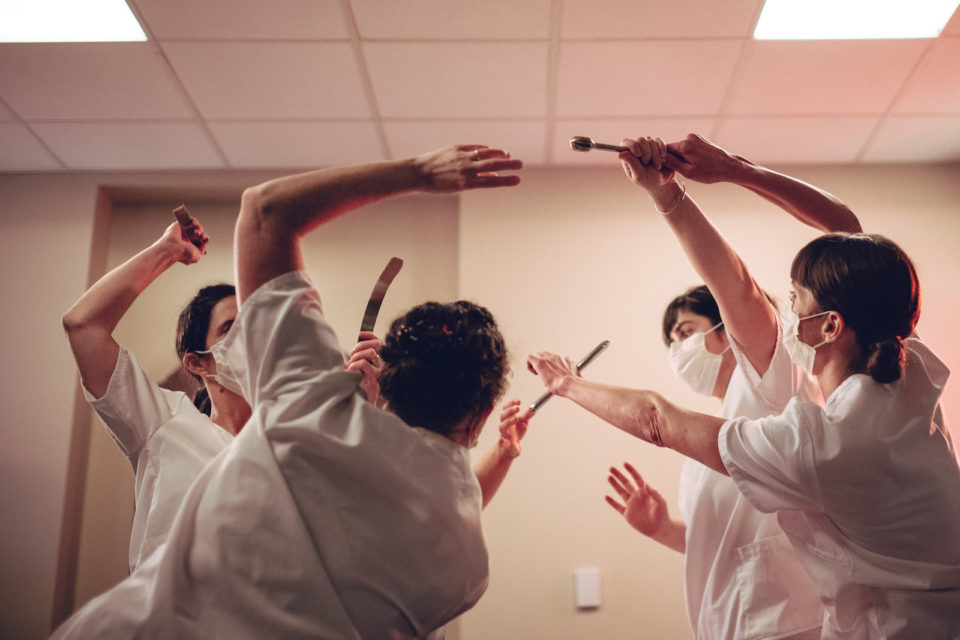The Local newsletter is your free, daily guide to life in Colorado. For locals, by locals. Sign up today!
Primetime television would have you believe that doctors and nurses spend their days delivering profound monologues. In reality, working at a hospital involves a lot of hard work, both physically and emotionally. Hospital workers spend their days on their feet, often lifting weakened patients from bed to gurney, wheeling that gurney, communicating with and reassuring worried family members, and conquering a tidal wave of paperwork, among other tasks.
The administrators at Rose Medical Center are showing their love for hospital staff by opening a space for them to decompress. The Wellness Lounge, which was fittingly unveiled on Valentine’s Day, is more than a room for quiet reflection; the 655-square-foot facility will be a space for health coaching, aromatherapy, massage, acupuncture, yoga, and more.
“We want to keep every single caregiver at their maximum wellness, whether that’s physical, mental, emotional, or spiritual,” says Lynne Wagner, chief nursing officer at Rose Medical Center and a member of the Wellness Committee, the group of employees that launched the lounge. “That way, we can continue to provide the best possible care to patients.”
Helping staff care for themselves—you’ve heard the wisdom of caring for yourself before you care for others—represents a growing challenge for hospital administrators. Burnout, or physical and emotional exhaustion brought on by work-related stress, is common in the healthcare field: A 2015 Mayo Clinic study revealed that about 54 percent of physicians surveyed were experiencing at least one symptom of burnout, and in a national CareerBuilder survey from 2017, seven out of every 10 nurses reported feeling burned out in their role.

This type of professional fatigue can lead to poor job performance or an early exit from a hospital position. Work-induced exhaustion impacts even the best teams: Brittany Reitsema, a nurse and wellness committee case manager, says she’s proud of the quality of care the staff delivers at Rose Medical Center. “We’re like a well-oiled machine,” she says. “But sometimes we need to refill.”
When workers can’t “refill,” they often leave: According to NSI Nursing Solutions, a national nursing recruitment company, hospital employee turnover reached rates of 18.2 percent in 2017, the highest it’s been in nearly a decade of annual reports. The Colorado Nursing Center put the in-state separation rate around 16 percent as of 2017. Even if a new hire is made, novice employees need to learn the ropes, forcing over-burdened workers to make time for training—time they barely have. (At 11.3 percent in 2018, turnover at Rose is lower than the national average.)

In an effort to keep workers happy and healthy, local hospitals are developing new perks and programs. The wellness incentive program at St. Joseph Hospital, for example, gives employees the opportunity to earn rewards (like gift cards) for engaging in healthy activities. Wagner also credits Presbyterian St. Lukes Medical Center, which was used as a model for many aspects of Rose Medical’s wellness program. That includes a set of high-tech massage chairs, three of which will be placed in Rose’s Wellness Lounge. “They feel amazing,” says Reitsema. “It’s a nail salon chair on steroids.”
The Wellness Lounge isn’t the first time the Rose Medical Center has rolled out a service designed to prevent burnout. Last October, registered nurse and dancer Tara Rynders launched an immersive performance series called First, Do No Harm, which shepherded audience members through the hospital, allowing them to see the empathy nurses at Rose pour into their work. “I wanted to bring awareness to compassion fatigue and nursing burnout,” says Rynders.

This blossomed into a project Rynders calls “The Clinic,” which uses art to help nurses connect more deeply with patients. In one exercise, a nurse and patient make contour line drawings of one another’s faces when they first meet, never lifting their pens. Rynder says the results are typically hilariously Picasso-esque. “They usually laugh and hang up the two drawings in the room,” she says. “The patient can look back on that as a connective moment that they shared with their nurse that was fun, silly, and easy.”
Members of the Wellness Committee hope the new lounge will have a similar effect at Rose Medical Center. The plan certainly seems promising. Though funded entirely by the hospital, Progressive Health Center, a local nonprofit helping doctors take a more holistic approach to healing, worked with the committee to form a complete body (and mind) wellness plan. Part of this plan is having a health coach on site for 40 hours each week, including some nighttime and weekend hours (because a hospital is a 24/7 workplace, says Wagner). Reitsema actually tried the health coaching services last year, while the committee was designing the lounge. “I get overwhelmed with all my different responsibilities between work and home, but health coaching helped me prioritize and set reasonable goals,” she says. “With that support, my satisfaction with life and work sky-rocketed. It was the best thing I did for myself in 2018.”
While more extensive acupuncture, massage, and health coaching sessions won’t be completely free, the entire hospital staff, including surgeons, administrators, and members of the cleaning crew, will have access to complimentary yoga classes, massage workshops, aromatherapy, and, of course, the chairs. “The lounge has so many offerings,” says Reitsema. “So whether it’s massage therapy, acupuncture, aromatherapy, or just a place to come shut your brain off, it has something for everyone.”








